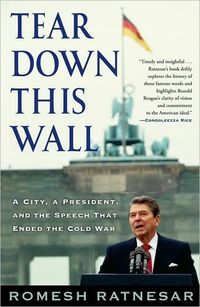 THE POTTING SHED MURDER |
 Sunshine, secrets, and swoon-worthy stories—June's featured reads are your perfect summer escape. |

Purchase
Simon & Schuster Non-Fiction Excerpt of Tear Down This Wall by Romesh RatnesarINTRODUCTION The morning of May 15, 1987, was a busy one for Ronald Reagan. “Quite an agenda,” he recorded in the diary he updated every day of his presidency. He reviewed names of possible appointees to a commission on AIDS—the disease that was claiming tens of thousands of lives but which Reagan had only recently acknowledged. At a meeting of the National Security Council, Reagan found his disputatious secretaries of state and defense, George Shultz and Caspar Weinberger, feuding over whether the United States should agree to a major arms cut proposal made by the Soviet Union’s leader, Mikhail Gorbachev. Reagan was also informed that a U.S. Army nurse had been kidnapped in Mozambique. “I want her rescued if we have to blow up the whole d——m country,” he wrote later. After lunch and a meeting with regional newspaper journalists, the seventy-six-year-old president retired “upstairs for the afternoon and evening,” with a stack of material to read over the weekend. Among his papers were drafts of the speeches he was to deliver on an upcoming trip to Europe—including one he would be giving on June 12 in West Germany, in the shadow of the Berlin Wall. Even to some who knew him well, Reagan was a remote figure. His basic kindness and decency were obvious to all he encountered, but so were his emotional reserve and imperviousness to events that might disrupt his simple, sunny worldview. During his time in the White House, he rarely budged from a daily routine that included a lunch of soup and crackers, a light workout, and eight hours of sleep. On the morning of Reagan’s first inauguration, the man he had defeated, Jimmy Carter, received word that fifty-two American hostages, held in Tehran for 444 days, were to be released. When Carter phoned to give Reagan the news, an aide to Reagan, Michael Deaver, told the outgoing president that Reagan was sleeping and couldn’t be roused. “You’re kidding,” Carter said. “No, I’m not,” Deaver replied. By the final years of his second term, Reagan was often disengaged from the daily business of the presidency. His official biographer observed at the time that Reagan was “showing signs of depression, failing to read even summaries of important work papers, constantly watching TV and the movies.” Reagan’s celebrated speechwriter, Peggy Noonan, told an interviewer that when she met with Reagan before she left the White House in 1986, she had been struck most by his “frailty.” “He nods and encourages you,” she said, “but you’re never quite sure he hears every word.” But Reagan could still rise to the occasion. “He believed that giving speeches was one of the president’s most important duties,” says James Baker, who served under Reagan as chief of staff and later as treasury secretary. “I’ve never known a president who was better at utilizing the bully pulpit, which is the most important thing that a president has.” Reagan’s gift for public speaking had been evident as far back as his days at Eureka College, when his peers tapped him as their spokesman during a student strike against the school president. That talent was honed by thousands of commentaries, radio broadcasts, town hall meetings, and fund-raising speeches Reagan gave before he even mounted his first campaign for office in 1966. His detractors confused Reagan’s eloquence with glibness, dismissing his ability to connect with audiences as an old actor’s trick. But those judgments now seem hollow; heard today, Reagan’s best speeches—“Evil Empire,” the elegy for the crew of the space shuttle Challenger, “The Boys of Pointe du Hoc”—retain much of their rhetorical power. Reagan approached speeches not merely as public performances but as opportunities to present his views in clear and unmistakable terms. Even his closest aides said they often learned about Reagan’s position on a given issue only after he mentioned it in a speech. Former President Gerald Ford once remarked in wonder that Reagan “was one of the few political leaders I have met whose public speeches revealed more than his private conversations.” The address delivered by Reagan in West Berlin on June 12, 1987, was the 1,279th of his presidency. He was entering the twilight of his tenure. His long love affair with the American people had soured over the Iran-contra scandal. His approval rating had fallen twenty points in six months. On the world stage too, Reagan appeared a diminished figure, overshadowed by the dynamic Soviet leader, Gorbachev, whose push to reform the communist system seemed to be driving the course of history. In two dramatic summits to that point, Reagan and Gorbachev had established a promising personal connection, but their discussions had failed to yield tangible progress toward ending their nations’ rivalry. At their summit in Reykjavik, Iceland, in October 1986, the two leaders had come tantalizingly close to reaching an agreement to eliminate nuclear weapons, before the deal fell apart over Reagan’s refusal to abandon his plan to build a space-based defense against nuclear missiles. Few experts in either country believed the Cold War was about to end. But the world was changing. In Eastern Europe, small-scale rebellions against communist rule had begun to stir. On the eve of Reagan’s visit, hundreds of East German youths revolted near the Berlin Wall when police tried to prevent them from listening to a rock concert in West Berlin. Whether the American president sensed the ground moving, or merely allowed himself to imagine it, is difficult to know. As Reagan climbed the dais in front of Berlin’s Brandenburg Gate just after 2 p.m. on June 12, 1987, it is unlikely that he anticipated that by the end of the year he and Gorbachev would sign the first U.S-Soviet treaty to reduce nuclear weapons; that he would leave office in January 1989 declaring that “the Cold War is over”; and that just nine months would pass after that before the fall of the Berlin Wall. And even the man known as the Great Communicator might not have believed, on that gray Berlin afternoon, that his words would become the most memorable delivered by any American president in the last quarter-century. Along with the assassination attempt against him in 1981, Reagan’s appearance at the Brandenburg Gate remains the iconic image of his presidency. During the 2008 presidential campaign, Time named “Remarks on East-West Relations at the Brandenburg Gate” one of the ten best political speeches in history. USA Today rated “Tear down this Wall” the second most memorable quote of the last twenty-five years.* “You look for one line you remember a president by,” says Ken Duberstein, a former White House chief of staff who accompanied Reagan on that day in Berlin. “FDR is easy. Bill Clinton is easy: ‘I did not have sex with that woman.’ What is Ronald Reagan going to be remembered by? One line: Tear down this Wall.” Twenty years since the fall of the Berlin Wall, it is sometimes difficult for Americans to recall the antagonism, bitterness, and depredation that characterized the Cold War. For more than four decades, the United States and Soviet Union remained locked in a struggle, in President George H. W. Bush’s words, “for the soul of mankind.” It was a conflict that distorted national priorities and led both countries into disastrous misadventures; hundreds of thousands died in the proxy conflicts waged by the superpowers around the globe. Wars against communist foes in Korea and Vietnam claimed the lives of more than 100,000 American troops. For millions living under communism in Eastern Europe and the former Soviet Union, the price of the Cold War was paid in the form of dismal health standards, diminished life expectancy, an absence of political freedom, and the crushing of individual will. And due to the U.S.-Soviet arms race, for half a century the world lived with the specter of nuclear war, a hair’s-trigger away from Armageddon. In this contest of wills, Berlin was the most visible staging ground. Divided into four sectors by the conquering Allies after World War II, the city came to embody the contrast between two competing ideologies: the vibrant, market-oriented democracy of the West versus the gray, statist socialism of the East. The Berlin Wall, built by the communists in 1961, was the Cold War’s defining symbol. Stretching over 100 miles, reinforced with concrete, barbed wire, and dog runs, the Wall literally separated brother from brother, neighbor from neighbor, and block from block. During the thirty-eight-year existence of the Berlin Wall, at least two hundred East Germans were killed and another five thousand captured while trying to cross it. Symbolically, the Wall stood for the mistrust that plagued East-West relations during the postwar period. Reagan loathed the Wall. On a trip to West Berlin in 1978, he was taken to an eighth-floor office overlooking it and told the story of Peter Fechter, the youth who had been gunned down by East German police in 1962 as he tried to crawl over. The authorities left Fechter unattended for nearly an hour, while he bled to death. “Reagan just gritted his teeth when he heard all of this,” says Peter Hannaford, a longtime aide who was with Reagan that day. “You could tell from the set of his jaw and his look and some of the things he said that … he was very, very determined that this was something that had to go.” Reagan’s speechwriters knew this. From the start of the administration, they viewed themselves as the keepers of the flame of the Reagan revolution. The presidential trip to West Berlin in June 1987, which came on the occasion of the city’s 750th birthday, presented an opportunity to create one last signature moment ... Excerpt from Tear Down This Wall by Romesh Ratnesar |
|
| |||
|
||||



 © 2003-2025
© 2003-2025